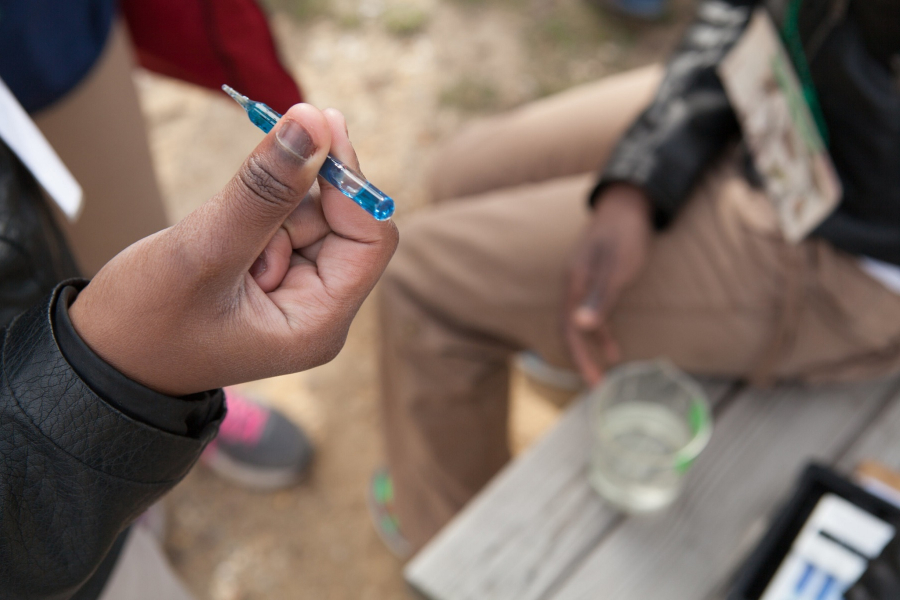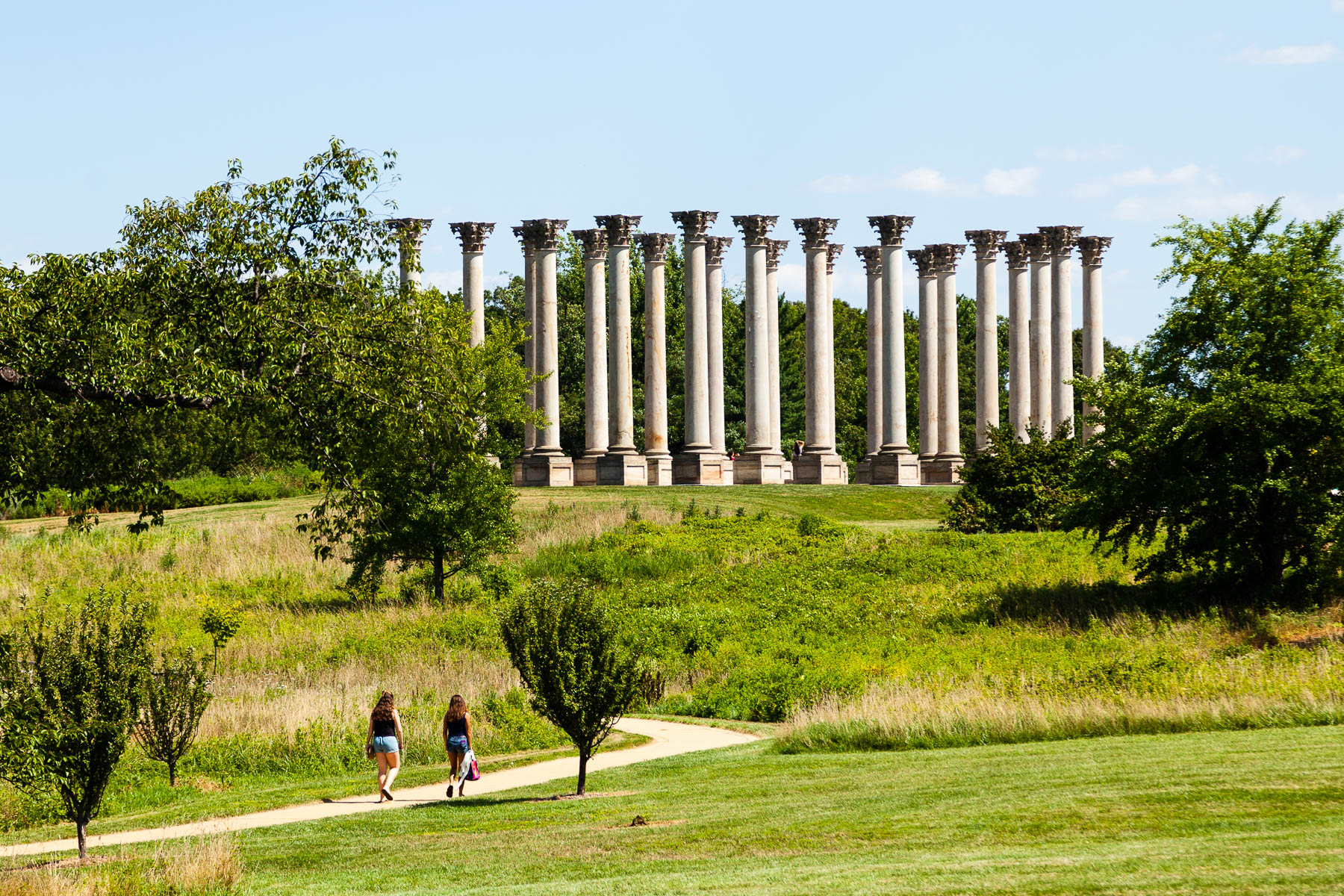Emergency funding allows environmental education to continue outside and online

For many students and teachers, it’s hard to remember what school was like before masks, vaccines and social distancing. When many school districts abruptly shut down in mid-March 2020, people simply didn’t know what to do. Kids were suddenly at home, staring at a computer screens. Parents panicked, struggling to teach, while working in the same room, at the same time. Teachers stared at blank screens, worrying about students they no longer could account for.
On the other hand, the natural world became our grounding force. Visits to state parks jumped in 2020, as people sought refuge in the outdoors. The Environmental Protection Agency’s Chesapeake Bay Program Office was able to re-allocate funds in order to provide emergency grants to help offset the hardships experienced by non-profits providing environmental literacy programming. The Chesapeake Bay Trust, a grant-making organization, administered the funding to grantees.
“The Ward Museum education department took a major hit when the museum shut down due to the pandemic,” said Brenda Miller, education director of the Ward Museum of Wildfowl Art. Located in Salisbury Maryland, the museum received $17,785 in grants that they put toward their Flock Around the Block and Wing Watch birding programs, that allowed children to connect with nature in a safe, outdoor environment. They were also able to adapt their Meaningful Watershed Educational Experience (MWEE) curriculum and field trip format to become virtual. “It is our hope that these programs provided students with engaging, hands-on experiences that offered them a break from the challenges of COVID-19, and we look forward to continuing to offer them in the years to come,” said Miller.
The criteria for applying for these grants was simple. You had to be a non-profit organization, located in the Chesapeake Bay watershed, experienced with environmental literacy programming and your program and/or project had to be completed by the end of 2021. For the Boxerwood Education Association, the grant announcement couldn’t have come at a better time. As Elise Sheffield, director of education puts it, “our grassroots non-profit in rural western Virginia was facing existential concerns.” A major source of funding for this organization came from program fees from their partnership with 12 local public schools and they simply were not big enough to pivot quickly to online programming. And as Sheffield explains, “as environmental education providers, we simply didn’t have the heart for it.”
Sheffield felt heartened by the Chesapeake Bay Trust’s and the Chesapeake Bay Program Office’s understanding of their unique situation and the faith they provided in them as to how they used the $19,990 they received. “We followed the kids,” she said. “We developed new outdoor programs for emergency childcare centers, family teaching pods, hiking clubs and created our own childcare programs too—all outdoors! In terms of programming and staffing capacity, we have actually increased and maintained our ability to provide more kinds of meaningful environmental learning to more kinds of people as a result of this opportunity.”

Other grant recipients included:
- Annapolis Maritime Museum and Park received $20,000 to support the adaption and implementation of the Box of Rain and School in Nature programs.
- Blue Sky Fund used $20,000 to support the adaptations and implementation of the Explorers program for third, fourth and fifth graders at Richmond Public Schools.
- ECO City Farms used $20,000 to support the transition of education offerings to a virtual format and provide at-home COVID testing kits to 3,000 Prince George’s County, Maryland students.
- Friends of Peirce Mill received $7,200 to support an online program for third graders in the District of Columbia that included live lessons and a virtual field trip.
- Friends of the National Arboretum used $19,985 to support the distribution of Grow-at-Home kits for 2,000 students and six safely-distanced Arboretum Family Days at the U.S. National Arboretum for high-needs school communities.
- Living Classroom Foundation received $19,998 to support the adaptations and implementation of a virtual School Leadership in Urban Runoff Reduction Project (SLURRP) program for fourth and fifth graders in South Baltimore, Maryland.
- Stroud Water Research Center used $14,442 to support the adaptation and implementation of virtual environmental education programs and created a Pennsylvania Watershed Literacy and Resources website.
Under the Chesapeake Bay Watershed Agreement, the Chesapeake Bay Program has an Environmental Literacy Goal and three related outcomes: Environmental Literacy Planning, Student and Sustainable Schools. Each year, the Environmental Protection Agency distributes funds to the six Goal Implementation Teams of the Chesapeake Bay Program to assist in furthering the outcomes of the Watershed Agreement. Funding for the “Equity and Environmental Education in the time of Coronavirus Disease 2019 (COVID-19) to Support Environmental Education Providers” grant was re-directed from this budget in 2020 to fulfill these critical needs.
"These funds supported the environmental education community during a challenging and uncertain time," said Shannon Sprague, environmental literacy and partnerships manager for the National Oceanic and Atmospheric Administration Chesapeake Bay Office and co-chair of the Chesapeake Bay Program Education Workgroup. "As opportunities to work with students in-person changed, our partners showed tremendous creativity and innovation to ensure that students in our region were still able to safely participate in engaging environmental education. Many of the products and innovations developed with this funding will continue to enhance our work after we return to pre-pandemic operations."

Comments
There are no comments.
Thank you!
Your comment has been received. Before it can be published, the comment will be reviewed by our team to ensure it adheres with our rules of engagement.
Back to recent stories